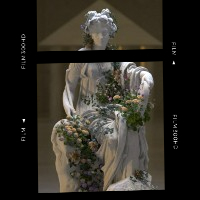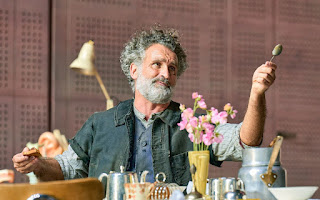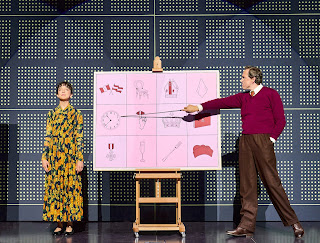Carvel's Higgins soon bets Colonel Pickering (Michael Gould) that he can mould Eliza's accent into an upper-class one, so convincingly that she could pass as a Duchess at an ambassador's reception. But it soon becomes apparent that class and manners aren't made of language alone.
Meanwhile it's left to Higgins' mother (Sylvestra Le Touzel) and housekeeper Mrs Pearce (Penny Layden,) as the only other women privy to the experiment, to question what'll happen to Eliza after the men are done with her, and whether her experience will change her in ways that are more than cosmetic. The theme of how insurmountable the British class divide is also gets a more broadly comic treatment in Eliza's father Alfred (John Marquez,) and the unexpected ways a huge cash windfall upturns his life.
Stewart Laing's designs are by no means plain, but they do feature a lot of open surfaces and wide open spaces on the Old Vic's huge stage, opening the story up from the dark and cluttered Edwardian rooms we might expect from this story. Similarly the costumes are period, but it's not always clear exactly what the period is - as the story goes on there seemed to be more and more 1920s flapper influence in some of the women's clothes, about a decade too early. Along with a comedic style that sometimes tips into the broad and almost dance-like, and music (by Will Stuart) that's sometimes used to punctuate the action like a film soundtrack, it serves to free the play from expectations and the constraints of a period piece, allowing what Shaw's actually saying to stand out.
I was a bit on the fence about whether Carvel actually pitches Higgins too broadly - he certainly suggests that the Professor's appalling social skills are what we would now recognise as neurodiverse, but the voice is very reminiscent of his Miss Trunchbull, especially when he starts hurling abuse at Eliza. Ferran first caught people's attention with a scene-stealing comic turn, and in recent years has been filling her awards cabinet with heartbreaking dramatic roles, and Pygmalion gives her the chance to marry the two: She's very funny at Mrs Higgins' afternoon salon, her new accent not quite matched by her old speech patterns, and earning a lifelong admirer in Taheen Modak's puppy-dog Freddie, but she's also very powerful to watch as Eliza eventually finds her own strength and independence.
And more than the themes of class it's the play's feminism that comes across - I was reminded of the Finborough's recent Makeshifts and Realities rediscoveries, written around the same time, in the way Shaw punctures the age's attitudes towards women, and how distinctions of class are a minefield around how much, and what kind of independence, a woman can expect. Evidently Shaw had to fight for the play's ending and had to put up with a lot of interference; not everything about Jones' approach quite works, and I can see this production not being for everyone, but there's no doubting that it ensures Higgins doesn't get to rewrite the ending in his favour, however much he wants to twist it.
Pygmalion by Bernard Shaw is booking until the 28th of October at the Old Vic.
Running time: 2 hours 10 minutes including interval.
Photo credit: Manuel Harlan.
*the theatre's credited him as George Bernard Shaw which he... famously didn't like to be credited as. Are they going to apply this full real name policy universally from now on, in which case can we expect What The Butler Saw by John Kingsley Orton, Tartuffe by Jean-Baptiste Poquelin, and Hamlet by Whoever Mark Rylance Thinks It Is This Week?





No comments:
Post a Comment